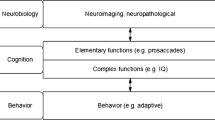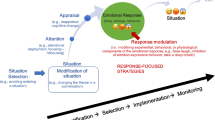Abstract
Rationale
Early life stress combined with heavy adolescent alcohol use predicts impaired neuropsychological functioning in adulthood. We investigated whether adolescent intermittent ethanol (AIE) exposure combined with neonatal maternal separation in rats altered attentional processes and impulsivity in adulthood.
Methods
Male Wistar rat pups were exposed to maternal separation (postnatal days (PNDs) 1–14) and moderate AIE exposure (PNDs 28–57). Adult rats were tested in the five-choice serial reaction time task, which provides separate measures of attention, motor impulsivity, and compulsivity. Rats were tested under baseline conditions and in response to task manipulations that increased attentional load and impulsive behaviors, and after acute ethanol administration.
Results
Short stimulus and short intertrial interval (ITI) durations disrupted attention while long ITI durations impaired impulsivity in all rats. Moderate- and high-dose ethanol challenges impaired attention in all rats. Rats exposed to maternal separation and/or AIE exposure had significantly decreased omissions than non-handled water-exposed rats at baseline and tended to retain this effect in response to task challenges (i.e., the shorter stimulus and ITI durations, longer test session) and ethanol challenges, indicating moderate improvement of attentional performance. Maternal separation significantly increased perseverative responses at baseline and in response to decreased stimulus duration challenge, suggesting increased compulsivity.
Conclusions
Separate or combined exposure to early life stress and AIE exposure moderately disrupts some aspects of adult executive control functions (e.g., increased compulsivity) but improves others (e.g., increased attention). The relative intensity of either manipulation during neonatal and adolescent periods may influence the direction in which cognitive behaviors are affected in adulthood.



Similar content being viewed by others
References
Aisa B, Tordera R, Lasheras B, Del Rio J, Ramirez MJ (2007) Cognitive impairment associated to HPA axis hyperactivity after maternal separation in rats. Psychoneuroendocrinology 32:256–266. doi:10.1016/j.psyneuen.2006.12.013
Amitai N, Markou A (2011) Comparative effects of different test day challenges on performance in the 5-choice serial reaction time task. Behav Neurosci 125:764–774. doi:10.1037/a0024722
Amitai N, Semenova S, Markou A (2007) Cognitive-disruptive effects of the psychotomimetic phencyclidine and attenuation by atypical antipsychotic medications in rats. Psychopharmacology 193:521–537
Bailoo JD, Jordan RL, Garza XJ, Tyler AN (2014) Brief and long periods of maternal separation affect maternal behavior and offspring behavioral development in C57BL/6 mice. Dev Psychobiol 56:674–685. doi:10.1002/dev.21135
Baudin A, Blot K, Verney C, Estevez L, Santamaria J, Gressens P, Giros B, Otani S, Dauge V, Naudon L (2012) Maternal deprivation induces deficits in temporal memory and cognitive flexibility and exaggerates synaptic plasticity in the rat medial prefrontal cortex. Neurobiol Learn Mem 98:207–214. doi:10.1016/j.nlm.2012.08.004
Bava S, Tapert SF (2010) Adolescent brain development and the risk for alcohol and other drug problems. Neuropsychol Rev 20:398–413. doi:10.1007/s11065-010-9146-6
Bizarro L, Patel S, Stolerman IP (2003) Comprehensive deficits in performance of an attentional task produced by co-administering alcohol and nicotine to rats. Drug Alcohol Depend 72:287–295
Boelema SR, Harakeh Z, van Zandvoort MJ, Reijneveld SA, Verhulst FC, Ormel J, Vollebergh WA (2015) Adolescent heavy drinking does not affect maturation of basic executive functioning: longitudinal findings from the TRAILS study. PLoS One 10:e0139186. doi:10.1371/journal.pone.0139186
Boutros N, Semenova S, Markou A (2014a) Adolescent intermittent ethanol exposure diminishes anhedonia during ethanol withdrawal in adulthood. Eur Neuropsychopharmacol 24:856–864. doi:10.1016/j.euroneuro.2014.01.022
Boutros N, Semenova S, Liu W, Crews FT, Markou A (2014b) Adolescent intermittent ethanol exposure is associated with increased risky choice and decreased dopaminergic and cholinergic neuron markers in adult rats. Int J Neuropsychopharmacol 18. doi:10.1093/ijnp/pyu003
Cannizzaro C, Plescia F, Martire M, Gagliano M, Cannizzaro G, Mantia G, Cannizzaro E (2006) Single, intense prenatal stress decreases emotionality and enhances learning performance in the adolescent rat offspring: interaction with a brief, daily maternal separation. Behav Brain Res 169:128–136. doi:10.1016/j.bbr.2005.12.010
Champagne FA, Francis DD, Mar A, Meaney MJ (2003) Variations in maternal care in the rat as a mediating influence for the effects of environment on development. Physiol Behav 79:359–371
Daoura L, Haaker J, Nylander I (2011) Early environmental factors differentially affect voluntary ethanol consumption in adolescent and adult male rats. Alcohol Clin Exp Res 35:506–515. doi:10.1111/j.1530-0277.2010.01367.x
Der-Avakian A, Markou A (2010) Neonatal maternal separation exacerbates the reward-enhancing effect of acute amphetamine administration and the anhedonic effect of repeated social defeat in adult rats. Neuroscience 170:1189–1198. doi:10.1016/j.neuroscience.2010.08.002
Ellenbroek BA, van den Kroonenberg PT, Cools AR (1998) The effects of an early stressful life event on sensorimotor gating in adult rats. Schizophr Res 30:251–260
Enoch MA (2011) The role of early life stress as a predictor for alcohol and drug dependence. Psychopharmacology 214:17–31. doi:10.1007/s00213-010-1916-6
Fernie G, Peeters M, Gullo MJ, Christiansen P, Cole JC, Sumnall H, Field M (2013) Multiple behavioural impulsivity tasks predict prospective alcohol involvement in adolescents. Addiction 108:1916–1923. doi:10.1111/add.12283
Givens B (1997) Effect of ethanol on sustained attention in rats. Psychopharmacology 129:135–140
Givens B, McMahon K (1997) Effects of ethanol on nonspatial working memory and attention in rats. Behav Neurosci 111:275–282
Guerri C, Pascual M (2010) Mechanisms involved in the neurotoxic, cognitive, and neurobehavioral effects of alcohol consumption during adolescence. Alcohol 44:15–26. doi:10.1016/j.alcohol.2009.21003
Hulshof HJ, Novati A, Sgoifo A, Luiten PG, den Boer JA, Meerlo P (2011) Maternal separation decreases adult hippocampal cell proliferation and impairs cognitive performance but has little effect on stress sensitivity and anxiety in adult Wistar rats. Behav Brain Res 216:552–560. doi:10.1016/j.bbr.2010.08.038
Lehmann J, Stohr T, Schuller J, Domeney A, Heidbreder C, Feldon J (1998) Long-term effects of repeated maternal separation on three different latent inhibition paradigms. Pharmacol Biochem Behav 59:873–882
Lehmann J, Stohr T, Feldon J (2000) Long-term effects of prenatal stress experiences and postnatal maternal separation on emotionality and attentional processes. Behav Brain Res 107:133–144
Lovallo WR (2013) Early life adversity reduces stress reactivity and enhances impulsive behavior: implications for health behaviors. Int J Psychophysiol 90:8–16. doi:10.1016/j.ijpsycho.2012.10.006
Lovic V, Keen D, Fletcher PJ, Fleming AS (2011) Early-life maternal separation and social isolation produce an increase in impulsive action but not impulsive choice. Behav Neurosci 125:481–491. doi:10.1037/a0024367
McCrory E, De Brito SA, Viding E (2010) Research review: the neurobiology and genetics of maltreatment and adversity. J Child Psychol Psychiatry 51:1079–1095. doi:10.1111/j.1469-7610.2010.02271.x
Oliver YP, Ripley TL, Stephens DN (2009) Ethanol effects on impulsivity in two mouse strains: similarities to diazepam and ketamine. Psychopharmacology 204:679–692. doi:10.1007/s00213-009-1500-0
Peeters M, Janssen T, Monshouwer K, Boendermaker W, Pronk T, Wiers R, Vollebergh W (2015) Weaknesses in executive functioning predict the initiating of adolescents’ alcohol use. Dev Cogn Neurosci 16:139–146. doi:10.1016/j.dcn.2015.04.003
Popke EJ, Allen SR, Paule MG (2000) Effects of acute ethanol on indices of cognitive-behavioral performance in rats. Alcohol 20:187–192
Rezvani AH, Levin ED (2003) Nicotine-alcohol interactions and attentional performance on an operant visual signal detection task in female rats. Pharmacol Biochem Behav 76:75–83
Robbins TW (2002) The 5-choice serial reaction time task: behavioural pharmacology and functional neurochemistry. Psychopharmacology 163:362–380
Sanchez-Roige S, Pena-Oliver Y, Ripley TL, Stephens DN (2014a) Repeated ethanol exposure during early and late adolescence: double dissociation of effects on waiting and choice impulsivity. Alcohol Clin Exp Res 38:2579–2589. doi:10.1111/acer.12535
Sanchez-Roige S, Baro V, Trick L, Pena-Oliver Y, Stephens DN, Duka T (2014b) Exaggerated waiting impulsivity associated with human binge drinking, and high alcohol consumption in mice. Neuropsychopharmacology 39:2919–2927. doi:10.1038/npp.2014.151
Semenova S (2012) Attention, impulsivity, and cognitive flexibility in adult male rats exposed to ethanol binge during adolescence as measured in the five-choice serial reaction time task: the effects of task and ethanol challenges. Psychopharmacology 219:433–442. doi:10.1007/s00213-011-2458-2
Semenova S, Markou A (2007) The effects of the mGluR5 antagonist MPEP and the mGluR2/3 antagonist LY341495 on rats’ performance in the 5-choice serial reaction time task. Neuropharmacology 52:863–872
Semenova S, Stolerman IP, Markou A (2007) Chronic nicotine administration improves attention while nicotine withdrawal induces performance deficits in the 5-choice serial reaction time task in rats. Pharmacol Biochem Behav 87:360–368. doi:10.1016/j.pbb.2007.05.009
Slawecki CJ (2006) Two-choice reaction time performance in Sprague-Dawley rats exposed to alcohol during adolescence or adulthood. Behav Pharmacol 17:605–614
Squeglia LM, Pulido C, Wetherill RR, Jacobus J, Brown GG, Tapert SF (2012) Brain response to working memory over three years of adolescence: influence of initiating heavy drinking. J Stud Alcohol Drugs 73:749–760
Wetherill RR, Squeglia LM, Yang TT, Tapert SF (2013) A longitudinal examination of adolescent response inhibition: neural differences before and after the initiation of heavy drinking. Psychopharmacology 230:663–671. doi:10.1007/s00213-013-3198-2
Author information
Authors and Affiliations
Corresponding author
Ethics declarations
Conflict of interest
This work was supported by NIH grant: U01-AA019970-NADIA (AM). The funding agency had no involvement in study design; in the collection, analysis, and interpretation of data; in the writing of the manuscript; or in the decision to submit the article for publication. AM has received contract research support from the Forest Laboratories and Astra-Zeneca and consulting fees from AbbVie during the past 2 years. The remaining authors report no financial conflicts of interest.
Rights and permissions
About this article
Cite this article
Boutros, N., Der-Avakian, A., Markou, A. et al. Effects of early life stress and adolescent ethanol exposure on adult cognitive performance in the 5-choice serial reaction time task in Wistar male rats. Psychopharmacology 234, 1549–1556 (2017). https://doi.org/10.1007/s00213-017-4555-3
Received:
Accepted:
Published:
Issue Date:
DOI: https://doi.org/10.1007/s00213-017-4555-3




